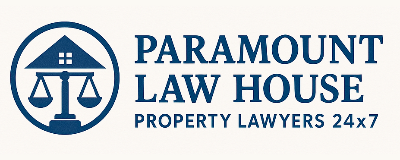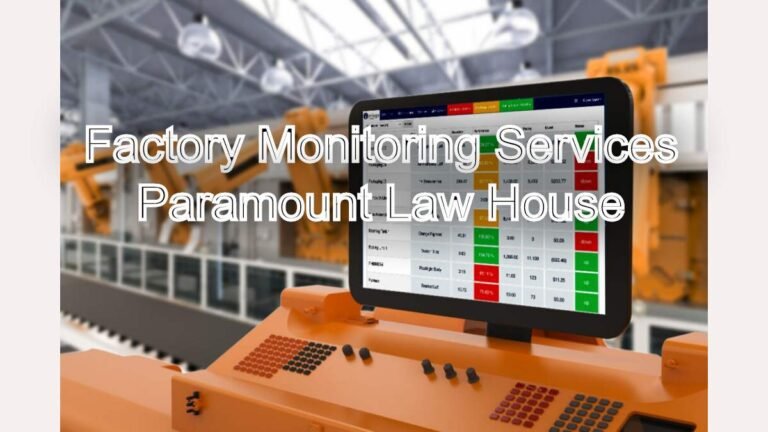Property Document Verification: Ensure Accuracy and Legitimacy
Property Document Verification: Buying or selling property is a significant life event. It involves a substantial financial commitment. It is, consequently, one…
Property Document Verification: Buying or selling property is a significant life event. It involves a substantial financial commitment. It is, consequently, one of the most complex legal transactions. The foundation of any property deal is its legal documentation. Flaws in these documents can lead to endless legal disputes. They can also result in financial loss. Therefore, meticulous property document verification is not an option. It is an absolute necessity. At Paramount Law House, we are property lawyers 24×7. We specialize in ensuring the accuracy and legitimacy of all property documents. Therefore, protect your interests. We ensure your investment is secure. This article will explain the critical process of property verification. It will also outline the legal terms and procedures involved.
A Flawless Foundation: The Imperative of Property Document Verification
The Title: Tracing the Chain of Ownership
First and foremost, the most crucial document is the Title Deed. This document establishes legal ownership. It is proof that the seller has the right to transfer the property. The verification process, consequently, involves a title search. This means tracing the chain of title. We examine all previous sale deeds and conveyance deeds. Go back at least 30 years. We, therefore, ensure there are no missing links. A clear title means that the property has an unbroken history of ownership. We also look for any disputes in the patta or khata. These are revenue records maintained by the local government. A discrepancy here can signal a serious issue. Our thorough search guarantees the seller is the legal and absolute owner.
Encumbrances: Uncovering Hidden Liabilities
Many properties come with hidden liabilities. These are known as encumbrances. An encumbrance is a claim or charge on the property. It could be a mortgage, a loan, or a lien. We, therefore, obtain an Encumbrance Certificate (EC). This certificate is issued by the Sub-Registrar’s office. It lists all registered transactions related to the property. We scrutinize the EC for any outstanding loans or claims. A property with an encumbrance cannot be transferred freely. We, furthermore, verify whether the property has any pending legal disputes. We also check for any public notices in newspapers. These notices may warn against a fraudulent transaction. This comprehensive check ensures your new property is free from any financial or legal burden.
Statutory Approvals: Ensuring Compliance
Construction projects are governed by strict rules. They require various approvals from government bodies. It is essential to verify these approvals. We check the Building Approval Plan. This plan must be sanctioned by the relevant municipal authority. We, therefore, ensure the construction is as per the approved layout. We also verify the Commencement Certificate. This document gives the green light to begin construction. A final check is for the Occupancy Certificate (OC). The OC certifies that the building is safe and fit for occupation. It is a mandatory document for newly constructed properties. Furthermore, we check the land use classification. We ensure the property is not on government land. This meticulous verification of statutory approvals protects you from future penalties or demolition notices.
The Role of Agreements and Deeds: A Flawless Framework
A property transaction involves several key documents. The Agreement to Sell is an initial document. It outlines the terms and conditions of the sale. We review this agreement thoroughly. We, therefore, ensure all clauses are fair and legally sound. The Sale Deed is the final and most important document. It is the legal proof of the transfer of ownership. We draft and review the Sale Deed with precision. We ensure it contains all the correct details. These include the property description, sale consideration, and details of all parties. This deed must be registered with the Sub-Registrar’s office. Registration provides legal validity. We also verify any Power of Attorney (POA). A POA allows a person to act on behalf of the owner. We ensure the POA is valid and gives the agent the legal authority to sell the property.
Tax and Other Dues: Verifying Financial Integrity
A property’s financial history is just as important as its legal history. Unpaid taxes can become your liability as the new owner. We, consequently, check all property tax receipts. We ensure all past dues have been cleared. Also verify water and electricity bills. We, furthermore, obtain a No Objection Certificate (NOC) from the building’s association or society. This NOC confirms there are no pending dues to the society. These financial checks prevent any future financial surprises. They, therefore, ensure a clean and transparent transaction.
Frequently Asked Questions
The Title Deed is the most crucial legal document for a property. It serves as legal proof of ownership. It establishes the seller’s right to transfer the property to the buyer. At Paramount Law House, we conduct a meticulous title search to trace the property’s chain of title for at least 30 years.
An Encumbrance Certificate (EC) is a document issued by the Sub-Registrar’s office. It lists all registered transactions and legal claims, or encumbrances, on a property over a specified period.
Statutory approvals are mandatory documents for construction projects. The Occupancy Certificate (OC) is a key document that certifies a building is safe and fit for occupation, and that it has been built according to the sanctioned plan. Verification of the OC and other approvals, such as the Building Approval Plan, is crucial to protect you from future legal actions, such as penalties or demolition notices for non-compliance.
The Agreement to Sell is a preliminary document that outlines the terms and conditions of a property sale. It is a promise to sell the property in the future. The Sale Deed, however, is the final and most important document. It is the legal instrument that officially transfers the ownership of the property from the seller to the buyer. The Sale Deed must be registered to be legally valid.
We perform a thorough check of a property’s financial integrity. This involves verifying that all past dues, such as property taxes, water, and electricity bills, have been cleared. We also obtain a No Objection Certificate (NOC) from the building society to confirm there are no pending dues. This step ensures that you, as the new owner, do not inherit any financial liabilities.
Conclusion
In conclusion, property document verification is a complex but vital process. It requires expert knowledge of property law, local regulations, and documentation procedures. A single error can have long-lasting and costly consequences. At Paramount Law House, we provide round-the-clock legal expertise. We meticulously examine every document. We trace the chain of title. Uncover any hidden encumbrances. We verify all statutory approvals. We, consequently, ensure your property is legally sound and secure. Your trusted partners. We, therefore, give you the confidence to make one of the most important investments of your life. Our commitment to accuracy and legitimacy is unwavering. We are here to safeguard your future. Are your property lawyers. We are here for you 24×7.
Read More
- Landlord Legal Support Services: Protect Your Rights
- Factory Monitoring Services: Legal Compliance Assurance
- Document Legal Verification: Ensure Authenticity and Validity
- Building Monitoring Services: Protect Your Property Investment
- DTCP Land Approval Services: Ensure Compliance and Approval
- Tamil Nadu Registration Department (TNREGINET):






